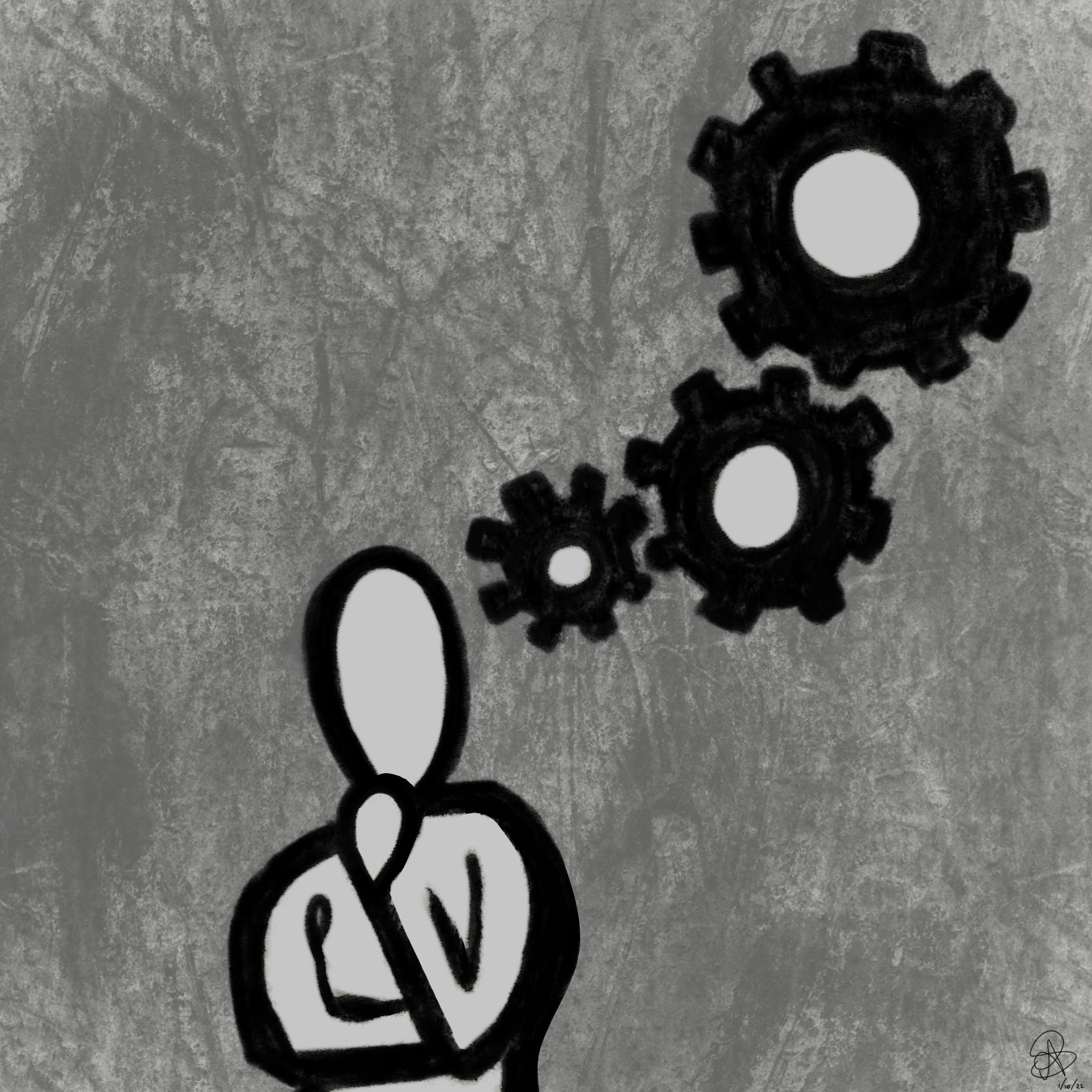
Most of us trust science in one way or the other. We follow our doctor’s advice or agree with the school’s methods of teaching us how to read. But deep inside, don’t we all feel we are rational beings who can think critically about any scientific argument? Don’t we lose our critical thinking muscle when we blindly trust science?
Most of us trust science in one way or the other. We follow our doctor’s advice or agree with the school’s methods of teaching us how to read. But deep inside, don’t we all feel we are rational beings who can think critically about any scientific argument? Don’t we lose our critical thinking muscle when we blindly trust science?

Photo by Anushka Sabhanam

Photo by Anushka Sabhanam
The short answer: No. Trusting science doesn’t make you less of a critical thinker. That is because you cannot be a critical thinker in every domain. Accepting the output of those who can think critically about a topic is not a sign of intellectual weakness. It comes from the understanding that critical thinking does not exist without in-depth knowledge. As Kevin deLaplante, a former academic philosopher of science, puts it: “knowledge is the dirty secret of critical thinking” (deLaplante, n.d.).
When universities say that they produce critical thinkers, what they mean is critical thinkers in a specific domain: people who can think critically about chemistry, law, psychology and so on. Some psychology books and soft-skills training give the impression that critical thinking is a universal skill. I would argue that this is not exactly the case. Reasoning is intimately connected with knowledge. Psychologist Halpern (2013) explains in her book about critical thinking that thinking starts with memory. When we reason about something, we evaluate it based on standards and facts that sit in our memory. Indeed, critical thinking is about evaluating and analyzing statements, but these processes look very different across disciplines and require deep factual knowledge (Willingham, 2007). Critical thinking is not a Swiss army knife, it is more like a custom-made piece of machinery for a factory. That is why general critical thinking training does not usually improve critical thinking by itself (Huber, & Kuncel, 2016).
“When universities say that they produce critical thinkers, what they mean is critical thinkers in a specific domain”
There is no such thing as critical thinking without knowledge. The best thinker of all time in biology will not be a critical thinker about history. But why is knowledge often forgotten when we talk about critical thinking? My guess is that it is because some of the definitions of critical thinking focus on what its output should be, while others focus on its necessary conditions or components. For example:
“Critical thinking is the use of those cognitive skills or strategies
that increase the probability of a desirable outcome.” (Halpern, 2013)
“Critical thinking (…), this seems to involve attitude plus knowledge of facts plus some thinking skills” (Russell, 1960, as cited in d’Angelo, 1971, p. 6)
Although knowledge does not always show up in definitions of critical thinking, it is considered a necessary condition for it, together with logical reasoning and attitudes such as seeking reason and being willing to be well-informed (for a review, see Lay, 2011).
Thus, common sense and pure logic are not sufficient for critical thinking. Many made-up arguments can sound completely logical and plausible. But you need specific knowledge to find out whether the argument holds in reality and not only in terms of surface logic. For instance, a faulty argument that shows up often in popular psychology is that when people have strong impulses or hard-to-control reactions, it is their “reptilian brain” that is taking charge – with the explanation that the human brain acquired more “rational” layers through evolution, but maintains a less rational, more instinctive, core from when our ancestors were similar to lizards. This is not correct, the brain did not evolve layer by layer in a hierarchy of more primitive to more civilized behaviors – and this is something that comes from background knowledge, not from the structure of the argument.
Another type of general knowledge that is necessary but not sufficient to critically think about a scientific argument is knowledge of methodology and statistics. You can have doubts when someone claims an effect of an experiment with no control group or an insignificant p-value. But without such faults, bad research can still look well done if you cannot see the nuances, the hidden assumptions, and the hidden inconsistencies, all of which require in-depth knowledge.
“Because you cannot be a critical thinker in every domain, it is crucial to have access to knowledge if you want to become one.”
This does not mean that people should refrain from asking questions or engaging with science in domains where they are not experts. But I think that the scale at which people want to be critical should match the scale of their knowledge. For instance, if they think all vaccines are harmful and want to base their health decisions on that, it is rational also to have enough knowledge of immunology, to be sure that what they are doing is indeed critical thinking and not surface logic. Those who wish to be critical thinkers must not forget that knowledge is an indispensable component.
My argument should not be taken to say that science should not be available to everyone or that scientists should not make an effort to communicate their findings in accessible ways. Because you cannot be a critical thinker in every domain, it is crucial to have access to knowledge if you want to become one. For example, when you want to make a healthcare choice you should have access to resources so that you can independently learn and build up the background knowledge you don’t yet have. It’s good to know this cannot happen overnight, but also that it is not impossible.
All in all, the fact that critical thinking is tied to a domain of knowledge shows that people will be able to think critically about some arguments and not about others, depending on the content of these arguments. When it comes to scientific arguments, this is one of the reasons why sometimes trusting science (as in, people who have scientific expertise about a given topic) might give you better odds of reaching the right conclusion. Nevertheless, people should always be free to access the knowledge they are missing and become critical thinkers in the domain they need to be. <<
References
– d’Angelo, E. (1971). The teaching of critical thinking.
– deLaplante, K. (n.d.) Critical Thinking’s Dirty Secret: The Importance of Background Knowledge. Retrieved October 10, 2022, from https://criticalthinkeracademy.com/courses/2516/lectures/51616
– Halpern, D. F. (2013). Thought and knowledge: An introduction to critical thinking. Psychology Press.
– Huber, C. R., & Kuncel, N. R. (2016). Does college teach critical thinking? A meta-analysis. Review of Educational Research, 86(2), 431-468.
– Lai, E. R. (2011). Critical thinking: A literature review. Pearson’s Research Reports, 6(1), 40-41.
– Willingham, D. T. (2007). Critical thinking: Why it is so hard to teach?. American federation of teachers summer 2007, p. 8-19.
The short answer: No. Trusting science doesn’t make you less of a critical thinker. That is because you cannot be a critical thinker in every domain. Accepting the output of those who can think critically about a topic is not a sign of intellectual weakness. It comes from the understanding that critical thinking does not exist without in-depth knowledge. As Kevin deLaplante, a former academic philosopher of science, puts it: “knowledge is the dirty secret of critical thinking” (deLaplante, n.d.).
When universities say that they produce critical thinkers, what they mean is critical thinkers in a specific domain: people who can think critically about chemistry, law, psychology and so on. Some psychology books and soft-skills training give the impression that critical thinking is a universal skill. I would argue that this is not exactly the case. Reasoning is intimately connected with knowledge. Psychologist Halpern (2013) explains in her book about critical thinking that thinking starts with memory. When we reason about something, we evaluate it based on standards and facts that sit in our memory. Indeed, critical thinking is about evaluating and analyzing statements, but these processes look very different across disciplines and require deep factual knowledge (Willingham, 2007). Critical thinking is not a Swiss army knife, it is more like a custom-made piece of machinery for a factory. That is why general critical thinking training does not usually improve critical thinking by itself (Huber, & Kuncel, 2016).
“When universities say that they produce critical thinkers, what they mean is critical thinkers in a specific domain”
There is no such thing as critical thinking without knowledge. The best thinker of all time in biology will not be a critical thinker about history. But why is knowledge often forgotten when we talk about critical thinking? My guess is that it is because some of the definitions of critical thinking focus on what its output should be, while others focus on its necessary conditions or components. For example:
“Critical thinking is the use of those cognitive skills or strategies that increase the probability of a desirable outcome.” (Halpern, 2013)
“Critical thinking (…), this seems to involve attitude plus knowledge of facts plus some thinking skills” (Russell, 1960, as cited in d’Angelo, 1971, p. 6)
Although knowledge does not always show up in definitions of critical thinking, it is considered a necessary condition for it, together with logical reasoning and attitudes such as seeking reason and being willing to be well-informed (for a review, see Lay, 2011).
Thus, common sense and pure logic are not sufficient for critical thinking. Many made-up arguments can sound completely logical and plausible. But you need specific knowledge to find out whether the argument holds in reality and not only in terms of surface logic. For instance, a faulty argument that shows up often in popular psychology is that when people have strong impulses or hard-to-control reactions, it is their “reptilian brain” that is taking charge – with the explanation that the human brain acquired more “rational” layers through evolution, but maintains a less rational, more instinctive, core from when our ancestors were similar to lizards. This is not correct, the brain did not evolve layer by layer in a hierarchy of more primitive to more civilized behaviors – and this is something that comes from background knowledge, not from the structure of the argument.
Another type of general knowledge that is necessary but not sufficient to critically think about a scientific argument is knowledge of methodology and statistics. You can have doubts when someone claims an effect of an experiment with no control group or an insignificant p-value. But without such faults, bad research can still look well done if you cannot see the nuances, the hidden assumptions, and the hidden inconsistencies, all of which require in-depth knowledge.
“Because you cannot be a critical thinker in every domain, it is crucial to have access to knowledge if you want to become one.”
This does not mean that people should refrain from asking questions or engaging with science in domains where they are not experts. But I think that the scale at which people want to be critical should match the scale of their knowledge. For instance, if they think all vaccines are harmful and want to base their health decisions on that, it is rational also to have enough knowledge of immunology, to be sure that what they are doing is indeed critical thinking and not surface logic. Those who wish to be critical thinkers must not forget that knowledge is an indispensable component.
My argument should not be taken to say that science should not be available to everyone or that scientists should not make an effort to communicate their findings in accessible ways. Because you cannot be a critical thinker in every domain, it is crucial to have access to knowledge if you want to become one. For example, when you want to make a healthcare choice you should have access to resources so that you can independently learn and build up the background knowledge you don’t yet have. It’s good to know this cannot happen overnight, but also that it is not impossible.
All in all, the fact that critical thinking is tied to a domain of knowledge shows that people will be able to think critically about some arguments and not about others, depending on the content of these arguments. When it comes to scientific arguments, this is one of the reasons why sometimes trusting science (as in, people who have scientific expertise about a given topic) might give you better odds of reaching the right conclusion. Nevertheless, people should always be free to access the knowledge they are missing and become critical thinkers in the domain they need to be. <<



